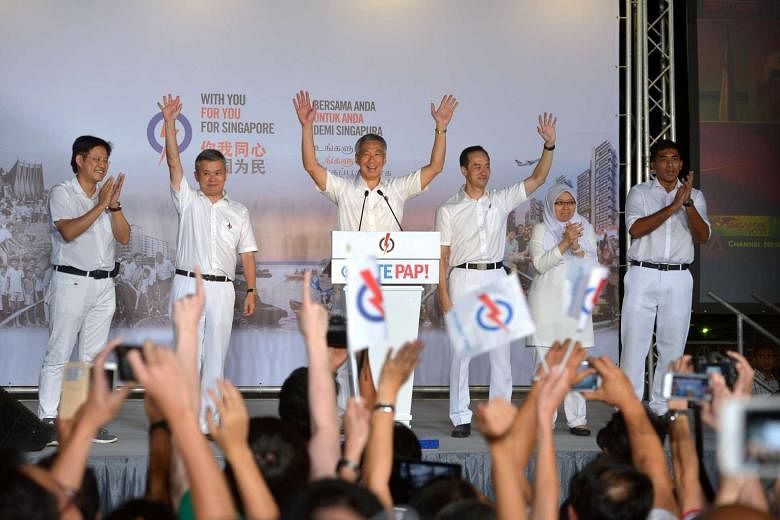SINGAPORE - The People's Action Party's (PAP) impressive gains in this General Election (GE) stemmed from a hard-earned effort.
The last four years have not been easy and showed what it takes to pull off such a verdict from the people.
If the party had slackened and failed to deliver on some of the policy areas that it worked so hard on - immigration, public housing and transport - the swing in its favour might not have been so large.
And if its candidates had not worked as hard to recover the ground they lost in 2011, they wouldn't be savouring the victory they deserved last night.
But this is the PAP - arguably the most successful political party in the world - and it came up with enough aces after the shock loss of Aljunied in 2011.
It is not easy to build 100,000 Housing Board flats in three years, and in doing so, the ruling party showed the depth of its strength in delivering quick results.
Ditto its policy initiatives in immigration, health insurance and healthcare for the pioneer generation.
What now for the future of the party?
Throughout the campaign, its leaders and particularly Deputy Prime Minister Tharman Shanmugaratnam stressed that the PAP had changed from what it was in the earlier days.
Its politics had softened, its policies had become more inclusive, it now practises a less rigid form of meritocracy and it was spending more on welfare.
Voters rewarded the party for its willingness and capacity to make these changes.
Expect more to come as it tries to find a new balance between hard-headed policies to make the economy more competitive and doing more to help those unable to cope with the rough edges of raw capitalism.
But policy is the easier part of the challenge for the PAP.
The tougher area is in replenishing its ranks, and this GE gave a glimpse of what it takes to keep its renewal humming.
It had worried publicly that the more competitive politics today will shrink its talent pool because capable Singaporeans are discouraged from entering the fray.
Why risk a successful career in the public or private sector for the rough and tumble of partisan politics and with no assurance of success?
Indeed, for young Singaporeans interested in politics, the Workers' Party (WP) might be seen as a more exciting party to join - fresher and more daring.
The PAP responded by fielding more from the private and people sector than in previous elections.
The more rounded selection hasn't hurt its performance at the polls, an early indication perhaps that it is heading in the right direction.
But, more important, the party will hope that its earlier fears over the shrinking talent pool would not come to pass.
If indeed this is the case, it will be a big boost for the party and keep its leadership ranks refreshed.
The strong mandate it has received should also put it in a more confident position to make the necessary changes to the party to meet the changing expectations of Singaporeans and win their trust.
This leads to the most critical question of all concerning renewal: Who will be its next leader?
Prime Minister Lee Hsien Loong led this campaign from the front, putting his leadership on the line, and he can justifiably claim a large part of the credit.
But for how long more can he do this?
At the moment, there is no clear successor and no one able to take charge, as he did, for the next election and beyond.
For the PAP, this is top priority over the next five years.
For the WP, this GE has consolidated its position, but only just.
Voters sent the party a very strong signal: Shape up or stay put.
It had slipped when it allowed its management of its town council to be attacked by the ruling party, casting doubts on its competence and more.
It knows it has to solve this problem in the next four years before the next GE.
Fail to do so and it might well be punished further.
The WP is adept at hitting the right emotional buttons to connect with those who dislike the PAP and do not want an overly dominant party.
But it has to do more to persuade others, who doubt its competency and its ability to be a credible alternative. This means being more active in Parliament, and taking a clearer stand on the important issues of the day.
Expect it to work harder on this front.
To do this well, it has to continue attracting younger Singaporeans with ability and commitment to join its ranks.
It remains to be seen whether its failure to make further electoral gains will set it back in its recruitment drive.
If it does, it will be a major blow to the party.
The hope the WP offered to opposition supporters four years ago of challenging PAP rule is still very much alive.
But it has been tempered by the reality that it will not be smooth sailing and it has to fight ever harder to regain the momentum.
On the whole, this has been a good result for the country with the political transition taking place at a controlled and gradual pace.
There has been no sudden shock or dislocation to the system.
Singaporeans are a pragmatic and sophisticated lot and they know instinctively what serves the country's interest best.
They rewarded the party which best learnt its lessons from GE2011.
Of all the signals that this election result sent, this message from voters was the clearest yet.


